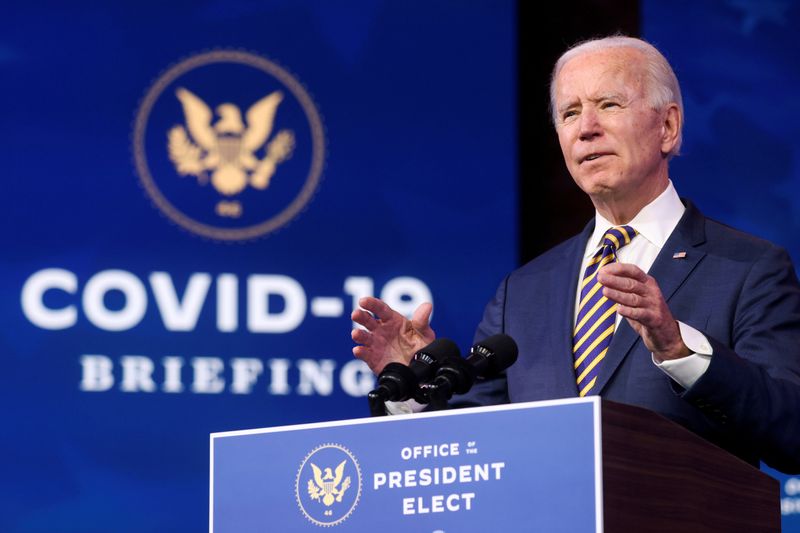By Andrea Shalal
WASHINGTON (Reuters) – U.S. President Joe Biden’s proposed $1.9 trillion economic stimulus package could boost U.S. economic output by 5% over the next three years, the chief economist of the International Monetary Fund said on Tuesday, citing preliminary estimates.
Gita Gopinath told Reuters the measures in the proposed package could add as much as 1.25% to U.S. growth in 2021, when the IMF projects the U.S. economy will expand by 5.1% after a 3.4% contraction in 2020. It predicts growth of 2.5% in 2022.
Gopinath said the IMF had not calculated the impact of the proposed stimulus package on the global economy, and would wait to see what the U.S. Congress approved.
“One of our first estimates on what the impact will be if the $1.9 trillion is passed … is a cumulative 5% increase over three years for the U.S.,” she said in an interview after the release of the IMF’s updated forecasts.
“We are still in an emergency situation in terms of the health crisis,” she said. “There are absolute needs to accelerate a lot of vaccinations, the amount of testing that gets done in the U.S. … and we also believe that there should be targeted support provided to struggling households and businesses.”
Biden, who took office on Jan. 20, has made addressing the COVID-19 pandemic, which has killed more than 420,000 Americans, thrown millions out of work and is currently infecting more than 173,000 people per day, a major focus of his agenda.
His plans calls for $1.9 trillion in spending to bolster the economy and help struggling families, on top of the roughly $4 trillion authorized over the past year.
PHASED APPROACH TO HIGHER WAGES
Gopinath urged caution on a central part of Biden’s plan – an increase in the federal minimum wage to $15 an hour from the current rate of $7.25, which was set in 2009 – a plan that has also drawn criticism from congressional Republicans and industry.
She said increasing the U.S. federal minimum wage could help reduce poverty and persistent inequality, but the target of $15 per hour was outside the range of increases seen elsewhere, which made its impact difficult to assess.
“There’s an argument to phase this in slowly to see what the effects are going to be … on employment and wages and jobs,” she said, potentially providing fodder to critics of the move.
U.S. Senate Majority Leader Chuck Schumer said on Tuesday he and his fellow Democrats will act alone to approve the stimulus measures if Republicans do not support the measure.
Schumer spoke after top Senate Republican Mitch McConnell, the chamber’s former majority leader, agreed to drop his blockade of a deal for a power-sharing agreement in the Senate, where each party controls 50 seats.
The Democrats have control of the chamber because Vice President Kamala Harris holds the tie-breaking vote.
Financial markets are betting the package could be smaller than the $1.9 trillion proposed by the Biden administration.
Gopinath, in a separate blog, noted the projected global recovery varied widely across countries, with faster recoveries seen in advanced economies due to their more expansive policy support and quicker access to vaccines.
But she warned that new waves of infections and problems with vaccinations still posed significant risks.
(Reporting by Andrea Shalal in Washington; Editing by Louise Heavens and Matthew Lewis)





